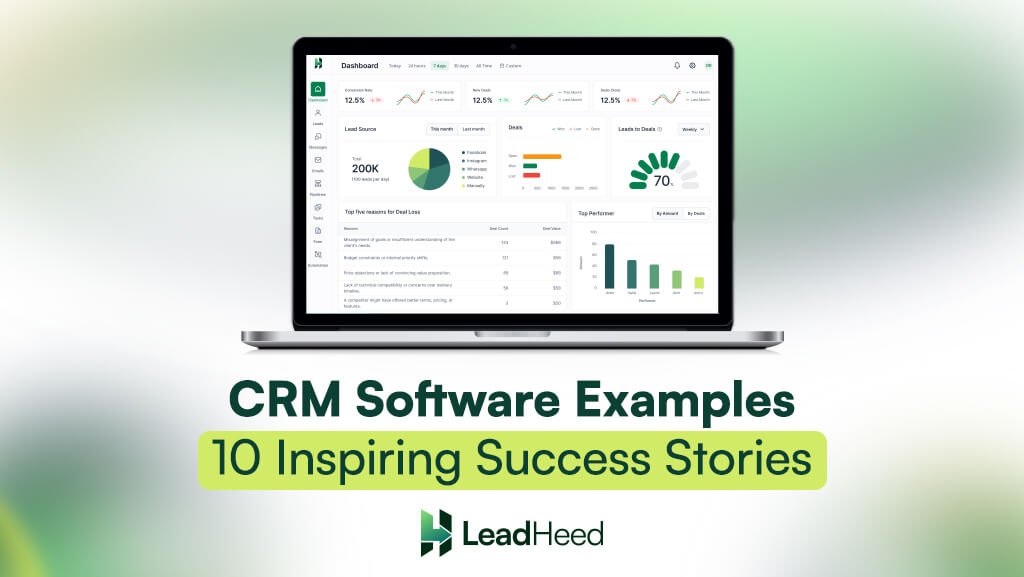In Dubai’s competitive market, even a single missed follow-up or overlooked client detail can cost your business valuable deals. Relying on scattered spreadsheets or outdated systems only makes tracking leads and customer interactions more chaotic. These inefficiencies slow your sales, frustrate clients, and hinder business growth.
The best CRM software in Dubai centralizes all your leads, sales, and customer interactions in one platform. It helps you stay organized, respond faster, and nurture stronger relationships, giving your business the edge it needs to thrive.
In this blog, we’ll explore why Dubai enterprises are turning to CRM solutions and showcase top options to help you find the perfect fit.
Why CRM Software is Essential for Businesses in Dubai, UAE?
CRM software is essential for businesses in the UAE because it helps manage customer relationships efficiently in a competitive and diverse market. The UAE’s competitive market demands faster responses and personalized services across touchpoints.
To keep up, businesses need a tool like CRM that keeps all customer details, sales, marketing, and support in one place. This makes it easier for teams to work together, manage leads, and respond to customers faster.
Some of the key benefits of CRM software for businesses are:
- Improved Customer Relationships: CRM offers personalized services and faster response with timely touch points to keep them happy.
- Sales Efficiency: Having a view of all your leads and sales pipelines helps you close deals faster.
- Automated Workflows: Saves your time by automating some of the routine tasks, such as follow-ups and reminders.
- Data-Driven Decisions: Access to detailed reports and analytics provides insights into customer behavior and business performance, helping you make smarter decisions.
- Enhanced Collaboration: Shares customer information across sales, marketing, and support teams, so everyone stays informed and aligned.
What Kinds of Businesses in the UAE need CRM Software?
Businesses of all sizes and industries in the UAE that deal with customers need CRM software to manage customer relationships and improve efficiency. From small startups to medium-sized enterprises, and industries like retail, real estate, and hospitality get benefits from CRM software. Here’s a breakdown of how different businesses benefit from CRM software:
- Small business owners and start-ups use CRM software to manage their contacts as they grow their business.
- Real estate firms, consultancies, and insurance businesses find CRM software useful in capturing leads and turning around business quickly.
- Retail businesses, hotels, and restaurants understand their customers better through the use of CRM software.
- Logistics businesses and trading companies manage their communications and orders effectively and efficiently.
- Health and medical services and property managers need CRM software to manage their clients’ appointments and securely organize their information for easy access.
Key Features to Look for in CRM Software
When choosing a CRM system, it’s essential to focus on features that help you manage customers efficiently and grow your business. The right CRM should organize customer information, track leads, automate routine tasks, and provide useful insights—all in one place. These capabilities make it easier for your team to stay connected with customers and work together smoothly.
Essential features to look for include:
- Contact Management: All customer data and past interactions must be stored in one place. This ensures you find and connect with the right customers at the right time.
- Third-Party Integration: A CRM integrates with other tools you use, such as email services, social media, and marketing services. This keeps your customer data synchronized and your workflows in order.
- Lead Management: Tracking leads automatically from all sources reduces the risk of potential customers falling through the cracks. Automating follow-ups and prioritizing high-potential leads helps your sales team focus on top opportunities and close deals faster.
- Email Management: Integrating email within the CRM simplifies communication by centralizing customer conversations. This ensures consistent, timely communication that builds relationships and keeps your interactions aligned.
- Task Management: This feature ensures timely follow-ups and order processing, reducing lost sales and enhancing team productivity.
- Sales Automation: Automating day-to-day sales tasks, like invoicing, order tracking, and re-order reminders, frees up your sales teams. This time can be used to build better relationships and drive higher revenue growth.
Growing Demand for CRM Systems in Dubai
The demand for CRM systems in Dubai has been growing due to rapid business growth and digital transformation. Dubai’s business scene is growing faster than ever. As the business grows, so does the number of customers and the conversations to keep track of. With industries shifting online and competition increasing, businesses now manage emails, social media, phone calls, and in-person meetings.
Without a proper system in place, you lose track, miss follow-up, and things get messy. You might forget to call a customer back or lose important details. A CRM system solves these problems by storing all customer information in one place.
A CRM helps teams track sales, set reminders, and share updates across departments, keeping everyone aligned. This makes it easier for businesses to stay organized, improve service, and build stronger relationships.
Top 12 Best CRM software in Dubai
Here are the top 12 CRM tools trusted by Dubai businesses to simplify sales, marketing, and customer management while ensuring local compliance.
1. Leadhead
LeadHeed is a powerful and easy-to-use CRM designed to meet the needs of businesses of all sizes. It is an all-in-one platform that combines sales, marketing, customer service, and automation tools. This helps teams manage leads, track opportunities, run campaigns, and deliver exceptional customer experiences.
LeadHeed supports smart automation, detailed reporting, multi-channel communication, and seamless integrations with popular apps. Thus, making it the perfect choice for businesses looking to grow and stay organized without juggling multiple tools.
Pros:
- Complete all-in-one solution for sales, marketing, and support
- User-friendly with strong automation features
- Real-time analytics and customizable reports
- Supports multiple channels like email, SMS, and social media
- Flexible pricing plans suitable for all business sizes
Cons:
- Newer platform, so some advanced features are continuously improving
2. Elate CRM
Elate CRM, developed by Penieltech and based in Dubai, is designed to help small and growing businesses manage leads, customers, and sales efficiently. It offers easy-to-use tools for lead and contact management, opportunity tracking, sales automation, and real-time sales insights. The platform also integrates with popular accounting tools like Tally Prime and QuickBooks to simplify your workflow.
Pros:
- Smart tracking and reminders ensure no leads are missed
- Real-time client and deal monitoring
- Highly customizable to fit your business needs
Cons:
- Pricing and plans are not publicly listed
- You need to contact the company for a quote
3. CorporateStack
CorporateStack CRM is a UAE-built platform designed for businesses in Dubai and the wider GCC. It combines lead, contact, and sales management with invoicing, payments, and automation. Its Arabic-English interface and region-specific features make it a strong choice for local companies.
Pros:
- Wide range of features, including project management and built-in sales insights
- Automatic reminders for follow-ups and due dates
- Easy-to-use interface with bilingual support
- Customizable to fit different industries and workflows
Cons:
- No free trial to test the software before purchase
- Pricing is not listed publicly — must contact the team for a quote
4. Super CRM
Super CRM is a cloud-based tool started in 2002 by the Al Wafaa Group in Dubai. The tool helps businesses store contacts, track leads, run campaigns, plan sales, and manage social media in one place. It also offers reports, dashboards, task tracking, and payment management to keep work organized.
Pros:
- Tracks renewals and payments
- Easy to request a demo
- Helpful local support
- Works on cloud and mobile
Cons:
- Best for small to medium businesses
- Pricing not shown publicly
5. Monday CRM
Monday CRM is a simple tool for small and medium businesses to manage sales and customers. It has visual sales pipelines, contact and lead tracking, automation for follow-ups, reports, and a mobile app. It also connects with tools like Gmail, Slack, and Zoom, making teamwork easier.
Pros:
- Very easy to set up and use
- Affordable plans with good features
- Automates tasks and integrates with many apps
- Mobile-friendly access
Cons:
- Not the best for very large companies
- Limited advanced analytics and lead scoring
6. Freshsales CRM
Freshsales CRM, from Freshworks, is built to help businesses boost sales by finding and focusing on the leads most likely to convert. It uses AI-powered lead scoring, automation, and a 360-degree customer view to give teams all key information in one place. Features include email tracking, direct calling, event tracking, lead management, and integration with other Freshworks tools like Freshdesk for support and Freshmarketer for campaigns.
Pros:
- AI-powered lead scoring for better sales focus
- Email tracking, direct calls, and event tracking
- 14-day free trial with full features
- Easy to import contacts and manage data
Cons:
- Training could be better
- Customer support can be slow at fixing bugs
7. Pipedrive CRM
Pipedrive CRM is designed for small and medium businesses that want to close more deals with less effort. Known for boosting sales performance, it helps manage leads, track emails and calls, and automate repetitive tasks. The platform is fully customizable, integrates with over 400 apps like Trello, Zapier, and Google Workspace, and works smoothly on mobile.
Pros:
- Very easy to use and customize
- Boosts sales with lead and deal tracking
- Automates admin tasks to save time
- 14-day free trial with no credit card needed
Cons:
- Best suited for small to mid-sized businesses only
- Some integrations are missing in the lower plans
- No lead scoring
8. Zoho CRM
Zoho CRM is a popular tool in Dubai that helps businesses manage marketing, sales, and customer service. It tracks leads, automates tasks with AI, and works well with many other apps. Zoho is affordable and supports different languages, making it a good choice for small and medium businesses.
Pros:
- Easy to customize and connects with many apps
- Uses AI to save time
- Supports multiple languages and keeps data safe
- Affordable plans starting at $14 per month
Cons:
- No customization in free versions
- Bugs and slow support.
- False virus alerts in file uploads.
9. Hubspot CRM
HubSpot CRM is a popular choice for startups and small businesses in Dubai. It helps you track leads and sales, manage appointments, and view up-to-date dashboards. You can easily monitor customer interactions, record calls, and send emails—all with minimal training. HubSpot works on Windows, Mac, Android, and iOS devices.
Pros:
- Free to use with live chat support
- Customizable to fit basic business needs
- Provides useful insights and easy lead tracking
Cons:
- Limited flexibility for larger or complex businesses
- Basic reporting features
- Advanced features require paid plans
10. WhitehatsCloud CRM
Whitehats is a Dubai-based company offering a cloud-based CRM platform with tools for managing sales, customer service, and operations. The CRM includes lead and sales management, service request tracking, and admin features like a dashboard and role management. The platform also competes with well-known names like HubSpot and Salesforce.
Pros:
- Highly customizable for any business or industry.
- Combines sales, service, and management features in one platform.
- Easy to manage products and create quotes fast.
Cons:
- CRM is newer and smaller than its big competitors
- Pricing details are not easy to find
- Mainly focused on the UAE
11. vCita CRM
vCita CRM is a CRM platform that combines customer management with appointment scheduling, marketing, and communication tools. It’s a great fit for small businesses and service providers who need to stay connected with clients. vCita stores all your client and lead information securely in the cloud, accessible from any device.
Pros:
- User-friendly design
- Interactive calendars synced with Outlook and Google
- Automation for follow-ups and marketing
- Simple marketing and lead management tools
Cons:
- Integration issues are causing confusion and limitations in functionalities.
- Costly with limited features
- Not suitable for businesses needing advanced sales tools or integrations
- Supports payment integration with select payment gateways.
12. RealSoft CRM
RealSoft CRM is a complete solution designed to help businesses manage leads, sales, projects, marketing, and customer support. It offers tools like lead management, project tracking, marketing automation, sales reporting, and an in-built messaging system. The platform is flexible, cloud-based, and accessible via mobile or on-premise setups, making it easy to stay connected and organized.
Pros:
- Supports multiple marketing methods
- Easy to upload and manage data
- Custom roles and responsibilities for team members
- Detailed sales and project reports
Cons:
- Complex due to many tools and plugins
- No fixed pricing plans offered
How to Choose the Best CRM Software for Your Business?
Choosing the right CRM requires defining your needs, planning your budget, and comparing different options. Testing and proper training are key to success.
This section will help you find the CRM that fits your business perfectly and boosts your growth.
Define your business needs.
Start by defining what you want to achieve from CRM, e.g., sales tracking, task automation, or customer support management. Identify must-have features you need, like contact management, sales pipelines, and marketing automation.
Set a practical budget
Consider not only the subscription cost but also setup expenses, training expenses, and support expenses on a continuous basis. Beware of hidden charges that may arise in the future.
Research CRM providers
Look for providers that are user-friendly and also possess good customer ratings. Read case studies or success stories to get an idea of how they function in real businesses.
Test before committing
Use a demo or free trial to see how the CRM fits into your daily work. This will allow you to find out if it’s really user-friendly and performs what you need.
Prepare for smooth adoption
Provide adequate training to your staff and roll out the CRM as part of your process. This helps you derive maximum value from the system.
Conclusion
In Dubai’s competitive market, CRM software is essential to keep all customer data, sales, and support organized in one place. With features like lead tracking, automation, and easy integrations to other tools, a CRM helps your team work faster and build better relationships. More businesses in the UAE are using CRM to grow and avoid missed chances.
If you want a simple and powerful CRM made for Dubai businesses, try LeadHeed CRM. It has smart automation, works with many channels, and gives helpful reports to help your business grow.
Want to see how it works? Request a free demo of LeadHeed CRM today!
FAQs
What are the benefits of using CRM software in Dubai?
Using CRM software in Dubai helps businesses manage customer data efficiently, track sales and leads, automate follow-ups, and improve communication across teams. It also supports better customer service, increases sales, and helps businesses stay organized while complying with local regulations.
How do I choose the right CRM software for my business in Dubai?
To choose the right CRM, understand your business needs, set a budget, research options, and test before deciding. With the right training and setup, your team will use it effectively.
How does CRM software help with Dubai data protection regulations?
CRM software helps comply with Dubai’s data protection rules by securing customer data through encryption, controlling access, and tracking data use. Many CRMs offer features to manage consent and privacy preferences, ensuring businesses follow local laws and protect customer information.
How much does CRM software cost in the UAE?
The cost of CRM software varies depending on business requirements and features, ranging from $0 to $900 per month (0 AED to 3,300 AED).
What is the most popular CRM software in Dubai?
The most popular CRM software in Dubai includes CorporateStack CRM, Salesforce, and Zoho CRM. CorporateStack is favored for its regional focus and bilingual support, while Salesforce and Zoho are known for their extensive features and global reputation.



